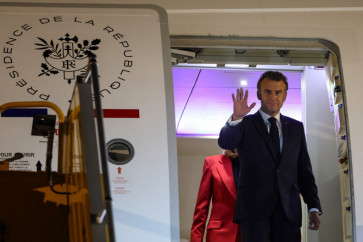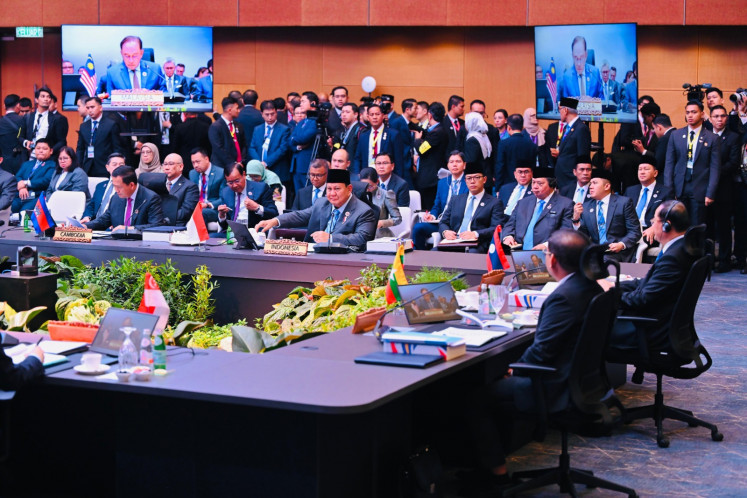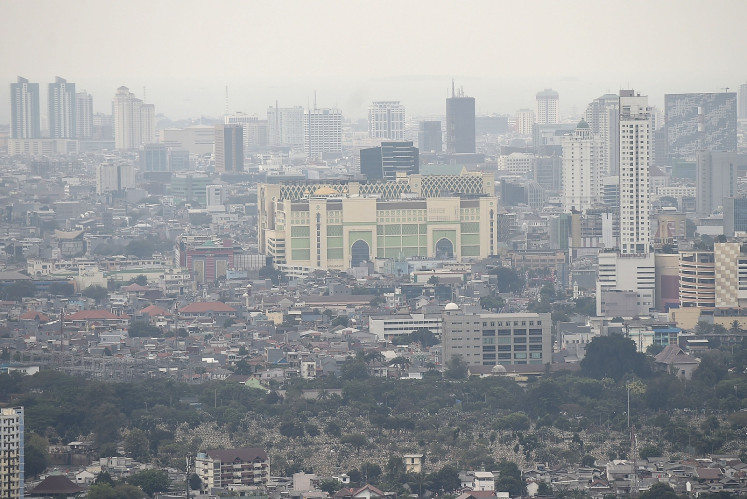Rupiah may remain weak for months to come: ANZ
Banking talk: ANZ Indonesia CEO Joseph Abraham (second left) is flanked by Consumer Banking vice president director Ajay Mathur (right) and commissioner Sity Leo Samudera (left) during a visit to The Jakarta Post on Wednesday
Change text size
Gift Premium Articles
to Anyone
 Banking talk: ANZ Indonesia CEO Joseph Abraham (second left) is flanked by Consumer Banking vice president director Ajay Mathur (right) and commissioner Sity Leo Samudera (left) during a visit to The Jakarta Post on Wednesday.(JP/Ricky Yudhistira) (second left) is flanked by Consumer Banking vice president director Ajay Mathur (right) and commissioner Sity Leo Samudera (left) during a visit to The Jakarta Post on Wednesday.(JP/Ricky Yudhistira)
Banking talk: ANZ Indonesia CEO Joseph Abraham (second left) is flanked by Consumer Banking vice president director Ajay Mathur (right) and commissioner Sity Leo Samudera (left) during a visit to The Jakarta Post on Wednesday.(JP/Ricky Yudhistira) (second left) is flanked by Consumer Banking vice president director Ajay Mathur (right) and commissioner Sity Leo Samudera (left) during a visit to The Jakarta Post on Wednesday.(JP/Ricky Yudhistira)
B
span class="caption">Banking talk: ANZ Indonesia CEO Joseph Abraham (second left) is flanked by Consumer Banking vice president director Ajay Mathur (right) and commissioner Sity Leo Samudera (left) during a visit to The Jakarta Post on Wednesday.(JP/Ricky Yudhistira)
The government needs to maintain business confidence and draw in investment to prevent a further economic slump as the weak rupiah may not see any improvement in the several months ahead, according to ANZ Indonesia.
The rupiah, which fell to Rp 14,000 per US dollar in August, will stay under pressure as global investors are still calculating the main influential factors, such as whether the US Federal Reserve will raise its fund rate, ANZ Indonesia president director Joseph Abraham said.
'I think it will last nine to 12 months,' Abraham said during a visit to The Jakarta Post offices on Wednesday.
According to him, Indonesia had vulnerability in terms of high reliance on foreign investment in its sovereign bonds, with 35 percent of government debt papers (SBN) held by foreign investors.
Given this fact, Abraham said Indonesia's foreign exchange (forex) market was sensitive to mood swings and investor sentiment, while adding that 'fundamentally the country is a lot stronger than 10-12 years ago'.
He added that ongoing pressure on the rupiah was also the result of the country's declining export growth as global commodity prices remained at low levels.
In July, Indonesia's overall exports declined 12.8 percent year-on-year (yoy) to US$89.7 billion, despite a 5.91 percent increase month-on-month in June, posing a major challenge to the government reaching its 28 percent export growth target this year.
A fall in exports has also contributed to the country's sluggish economy, which grew at 4.67 percent yoy in the second quarter, a level unseen since 2009. Economic growth was recorded at 4.72 percent in the first three months of this year.
Meanwhile, Bank Indonesia's (BI) exchange rate data shows the rupiah strengthened slightly on Wednesday to Rp 14,244 per dollar from Rp 14,285 a day earlier.
According to Sonny Samuel, head of markets at ANZ Indonesia, there has been no 'big time' intervention from BI in the forex market as the central bank had limited forex reserves ' at $105.3 billion as of August.
Despite concerns over the possibility of huge capital flight, Sonny said global investors remained confident that Indonesia would still be better off in terms of investment returns in its bond and stock markets than other emerging countries, such as Brazil and Turkey.
Sonny said recent data of net inflow of $5 billion showed investor confidence in the country, even after the rupiah started its slide to Rp 13,000 per US dollar mid-year.
'In the long run, Indonesia's economy will improve, but we still have to push government spending and build local confidence,' Sonny said.
Abraham said Indonesia was far from crisis, but rather in a serious economic slowdown. Therefore, the government should invite a huge scale of foreign direct investment to many sectors.









